In late August, forty Year 12 students from a broad range of widening participation backgrounds descended on the College to take part in our first ever Sustainable Urban Futures Residential, thanks to funding funding from the Isaac Newton Trust’s Widening Participation & Induction Fund. The students came from regions from across the UK including the College’s link areas of South Wales, South London, Thurrock, Surrey and Sussex as well as other locations from Darlington to Bristol.
The students worked together on team projects, researching, designing and problem-solving to address sustainable development challenges faced by communities in informal settlements. Their problem-solving briefs concentrated on the neighbourhoods of Favela de la Paz, Brazil and Makers’ Valley Johannesburg and they presented a showcase of their work to academics, postgrad students and local industry leaders. Central to the experience was the construction of an eco-shelter in the College gardens, with participants using basic construction methods to bring their classroom learning to life!
The highlight of my week was interacting with people studying different subjects from all over the UK and being able to collaborate and build such an amazing thing that I’d never have had the opportunity to do outside this programme
Ffion
Watch a timelapse video of the day 1 build:
The project leader, Churchill CORE Fellow Dr Rachel Thorley, was supported by a fantastic group of student ambassadors studying subjects from engineering and computer science to History and Music. The group included two Churchill College engineering students Lucy and Ewan who designed and tested the shelter prior to the residential as well as leading on the shelter construction in the College gardens and engineering activity at the Dyson Centre. Two more students from Churchill, Katie and Lucy, ran a session on geopolitics. Others who helped make the programme a success included the grounds & gardens team who ran a hog house / bug hotel building session, the College catering team who delivered a fabulous pizza night and joint formal hall dinner with STEM SMART students, and the Estates team who helped with site preparation.
Churchill Fellow Dr Rekha Bhangaonkar contributed to the programme with a talk on sustainable land use and Dr Josh Fitzgerald led a hands-on sustainable Aztec food heritage session which explored chia seeds as an Aztec foodstuff. Regenerative leadership was explored in a session led by Nicole Bosky from Primal. Other highlights included a visit to the Archaeology & Anthropology museum and a hands-on session at the Dyson Centre, where the group investigated solar photovoltaics and built a sensor-controlled circuit for dark-activated lighting suitable for an informal settlement.
In the student run geopolitics session, participants were grouped in delegations each acting as representatives of stateless nations, indigenous peoples, and minority communities. The aim of the session was to directly engage the participants with the issues facing some of the world’s most marginalised communities, offering an opportunity to develop the tools and confidence to become advocates for their community through practising public speaking and debating skills.
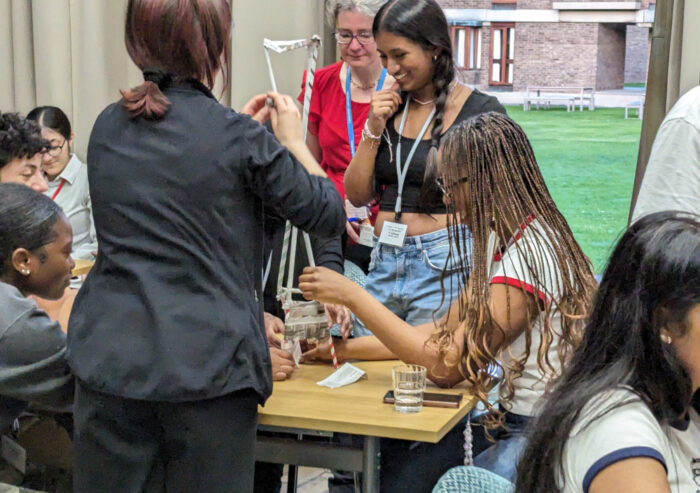
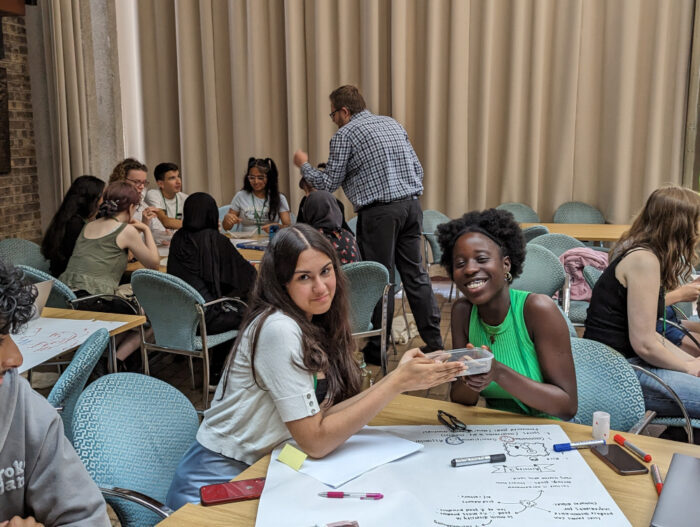
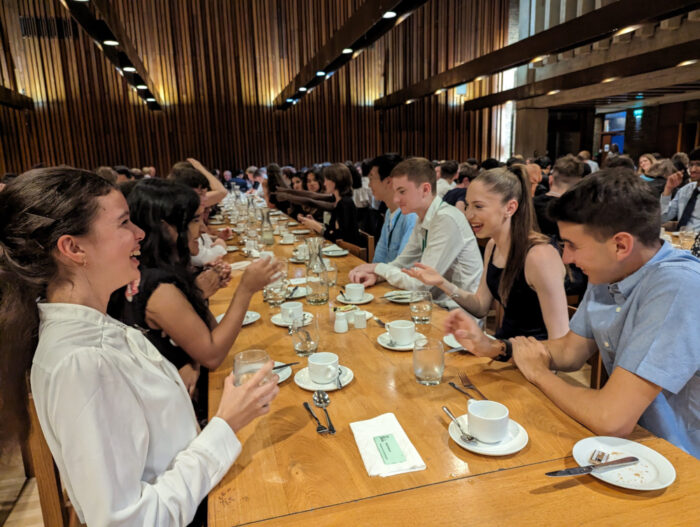
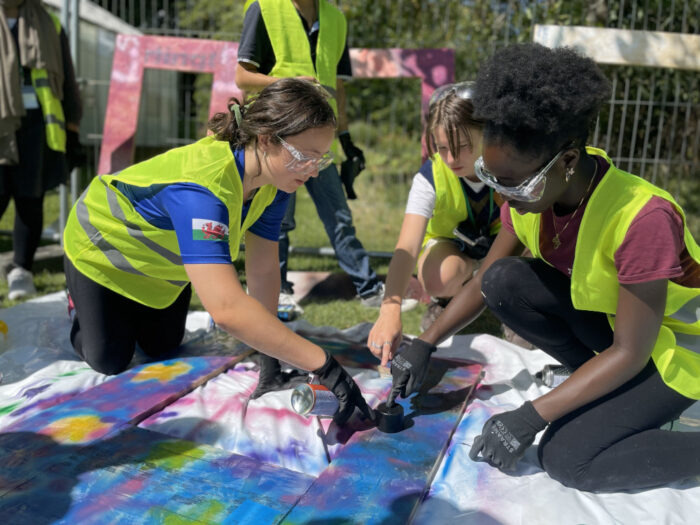
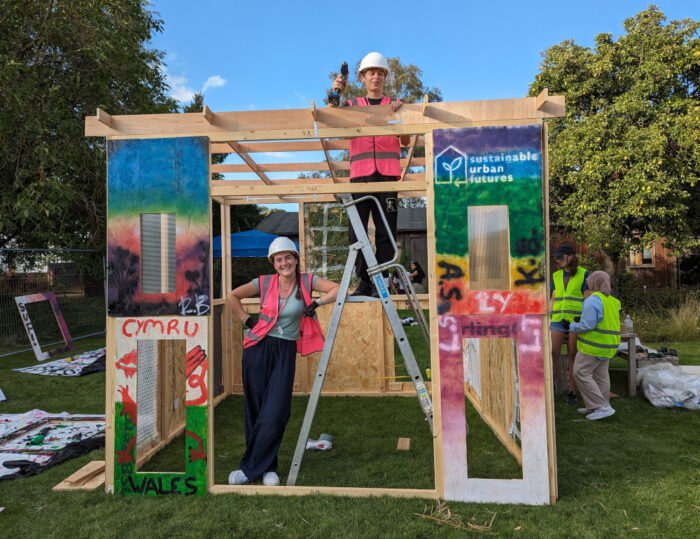
The College’s Widening Participation Officer Nathalie Abbot gave advice on applying to Cambridge, and role models were also available to chat about their career journeys and how they contributed to sustainability. The role models included architect Susannah Willets from PLP architecture and current Churchill College MPhil student Samantha Chinyoka.
Project impact
With the dust now settled after a busy and successful week, we met with the project leader, Churchill CORE Fellow Dr Rachel Thorley to hear her reflections on the project and its impact, plans for the future and feedback from some of the course participants.
Why was this opportunity so important?
Traditionally, education is siloed, and it is not until much later in university or career where interdisciplinary links and collaborations encouraged. This ground-breaking programme highlights the links between subjects and how a cross-curricular approach and diversity is needed to tackle the massive challenges our planet is facing including Sustainable Development, the focus of this week.
Something that I learnt this week is how sustainability can be applied to loads of different areas that I didn’t really consider before, like geo-politics, archaeology, and engineering. I wouldn’t really have thought about it in that context before, but it was really great that we were able to do it here. I just think it’s so important because sustainability is going to be a part of everybody’s careers in the future if we want to make a difference to climate change.
Tilly
The project also offered an opportunity for those from widening participation backgrounds to demystify Cambridge and university study & break down stereotypes of interdisciplinary degree options, facilitating young people to aspire to be changemakers for global sustainable development.
My main take-away was being able to experience what it’s like being a student at Cambridge. I think it put me at ease being around my peers and seeing that I could actually fit in being in a place like this, and also getting to experience the Cambridge teaching. When we had taster lectures with some of the Fellows, it was really nice to see how interactive it was. I was almost a bit nervous that I wouldn’t have anything to contribute, but I found it was a really welcoming environment and I didn’t feel nervous to say anything.
Leila
One thing that surprised me was how welcoming and friendly everyone was and how supportive they’ve been for the entire week – the staff, the pupils, everyone that was part of the College, they really made me feel like I fit in and belong here and I think that had been my main concern before coming. I’ve met so many people that I never thought I’d meet and learned so much about the environment, sustainability and other people’s cultures. It’s been a really amazing experience and I would not change anything.
Joel
What most surprised you about the week?
It was a privilege to meet such a motivated and engaged group of young people. Many participants had never stayed away from their families before and didn’t know anyone else on the programme before arriving. By the end of the week I could not tell as the group gelled so well! This university experience will be invaluable for all who took part which will set them apart on their UCAS applications and help them consider which university options can aid them in making a difference to global issues they care about. We are very grateful to the Isaac Newton Trust’s Widening Participation & Induction Fund for helping make this happen.
What benefit is there to funders in supporting this programme?
- An opportunity to promote equality and diversity.
- A development opportunity for employees who wish to contribute or volunteer time to work with young people on this programme
- The chance to interact with young people in sixth form from diverse backgrounds and subject interests as well as with university of Cambridge students
- An opportunity to contribute to the programme, e.g. running a session that links to an area relevant for your industry
What next?
We would love to run this programme again in future years, both as a residential here at Churchill College, and to reach into communities as a roadshow. Funding is needed to make this possible.

